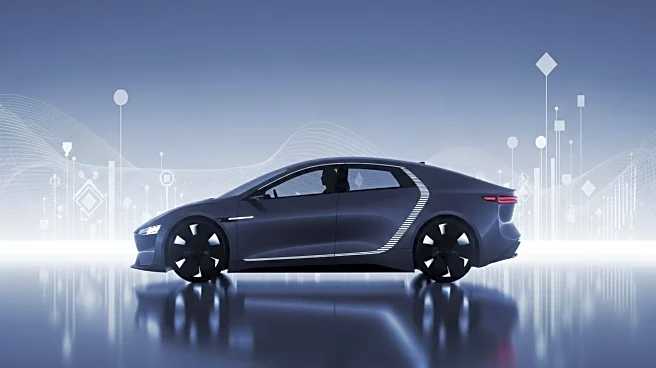What is the story about?
What's Happening?
Nvidia's automotive segment reported a significant 69% year-over-year increase in revenue for its fiscal 2026 second quarter, reaching $586 million. This growth is primarily attributed to the company's self-driving solutions, including the introduction of the DRIVE AGX Thor system on chip (SoC), which succeeds the Orin self-driving platform. Nvidia's full-stack solutions combine hardware and software to enhance advanced driver-assistance features in next-generation vehicles. Major automakers like Toyota, Mercedes-Benz, and Volvo are utilizing Nvidia's self-driving technology, contributing to the company's expanding presence in the automotive industry.
Why It's Important?
The growth in Nvidia's automotive segment underscores the increasing demand for self-driving technologies and advanced driver-assistance systems. As the industry shifts towards higher levels of autonomy and generative AI, Nvidia's innovations are poised to open new revenue opportunities while enhancing vehicle safety. This development is significant for the automotive industry, as it highlights the potential for self-driving technology to become a multitrillion-dollar business. Companies like Tesla and Waymo, which rely on Nvidia's chips for their autonomous vehicle models, stand to benefit from these advancements.
What's Next?
Nvidia's continued investment in self-driving technology and partnerships with major automakers suggest further expansion in the automotive sector. The company's focus on embodied AI, where physical objects like cars harness AI to interact with the real world, indicates a potential revolution in robotics and autonomous vehicles. As Nvidia's technology becomes more integrated into the automotive industry, stakeholders can expect advancements in vehicle autonomy and safety, potentially leading to widespread adoption of self-driving cars.
Beyond the Headlines
The ethical and legal implications of self-driving technology remain a topic of discussion as Nvidia's solutions gain traction. Issues such as liability in autonomous vehicle accidents and the impact on employment in the transportation sector are critical considerations. Additionally, the integration of AI in physical objects raises questions about privacy and data security, which will need to be addressed as the technology evolves.















